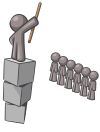 Misguided politics and the ever changing bureaucratic bungles of CV-19 policymakers have brought financial ruin and emotional hardship to many Canadians. The apparent desire to hinder free enterprise, and digitally track citizens, appears to override the common sense of having sequestered and protected vulnerable citizens from the outset.
Misguided politics and the ever changing bureaucratic bungles of CV-19 policymakers have brought financial ruin and emotional hardship to many Canadians. The apparent desire to hinder free enterprise, and digitally track citizens, appears to override the common sense of having sequestered and protected vulnerable citizens from the outset.
It is questionable whether the government’s action of tracking the activities of free human beings in a democratic society is even an acceptable exercise in the first place. And once the passport system is fully implemented, the odds of authorities ever removing such a control measure would likely be zero. Surely, they could justify a multitude of reasons to keep it in place. Then what?
As many governmental decisions lately appear to “reign-down” (spelling intended) from agendas external to the needs of the Canadian people, it is no wonder many citizens are concerned as to just exactly what the end game is. The rumour-mill is buzzing because nobody can get a straight answer from those who are supposed to have the answers. Building on a comment made by the PM himself, is CV-19 the catalyst for Canada to become a post-nationalist state of a yet to be defined global entity, and if so, who gave him and his entourage the permission to proceed with such a project? The Canadian people? Not likely – they were not even consulted. Decisions of that magnitude surely should hinge on the democratic agreement of all citizens, not the dictates of an elitist few. It does beg the question; “Does the virus drive the desire for the control mechanisms, or the other way around?” It is a fair question.
The medieval fear tactics implemented over a virus, that in many cases is so mild it is completely unnoticeable, seems more than a little irrational. Intentionally or not, there is no proper context given when numbers are regurgitated daily on the news. Why is that? For two years, the hysteria over case counts has outranked the more informative statistics of deaths-per-100,000 and the co-morbidity evidence available. The survival rate is officially documented at just under 100% in total cases reported. The facts are clear, yet the scare-tactics persist, as a 2005 quote may explain:
“By keeping the population in a state of artificially heightened apprehension, the government-cum-media prepares the ground for planting specific measures of taxation, regulation, surveillance, reporting, and other invasions of the people’s wealth, privacy, and freedoms. Left alone for a while, relieved of this ceaseless bombardment of warnings, people would soon come to understand that hardly any of the announced threats has any substance and that they can manage their own affairs quite well without the security-related regimentation and tax-extortion the government seeks to justify.” (1)
Ultimately, a population in fear tends to develop a disproportionate psychological dependency upon an ever increasing paternalistic government. If that is the endgame, Saul Alinsky would be proud.
(1) Higgs, Robert, Senior Fellow in Political Economy. “Fear: The Foundation of Every Government’s Power”, 2005, Research Article, Independent Institute, Fear: The Foundation of Every Government’s Power: Independent Institute


 Covid – A Cover for “Progressive” Ambitions?
Covid – A Cover for “Progressive” Ambitions? One does not need to be of the Christian faith to appreciate the beauty of the Christmas story. As every parent will attest, the birth of a child is the birth of hope itself. It is a time of joy, a time to celebrate and look forward. And so, it is at Christmas as we rejoice the miracle of the baby born in a manger during a historical time of violent oppression and chaos. The birth signifies the beginning of renewed hope for the future.
One does not need to be of the Christian faith to appreciate the beauty of the Christmas story. As every parent will attest, the birth of a child is the birth of hope itself. It is a time of joy, a time to celebrate and look forward. And so, it is at Christmas as we rejoice the miracle of the baby born in a manger during a historical time of violent oppression and chaos. The birth signifies the beginning of renewed hope for the future. There is a reason for the separation of powers in politics.
There is a reason for the separation of powers in politics. In an innate desire to avoid confrontation, humans often acquiesce to the illogical reasoning of others, one seemingly small increment at a time. They push uncomfortable, or potentially dangerous, issues down the road in the hope that the altercations, they are trying to avoid, never transpire. The result: undesirable actions are allowed to compound and multiply.
In an innate desire to avoid confrontation, humans often acquiesce to the illogical reasoning of others, one seemingly small increment at a time. They push uncomfortable, or potentially dangerous, issues down the road in the hope that the altercations, they are trying to avoid, never transpire. The result: undesirable actions are allowed to compound and multiply. There is too much for the concerned taxpayer to worry about right now. But even though focus and prioritizing have become complex issues within themselves, without them, no solution will ever appear.
There is too much for the concerned taxpayer to worry about right now. But even though focus and prioritizing have become complex issues within themselves, without them, no solution will ever appear. History provides many examples of political deception and dishonesty, carried out by nefarious players seeking personal gain and control, by attaining public office. Ultimately, it is the responsibility of citizens to demand governmental restraint, but for the most part they are hobbled from navigating that bureaucracy – the very system they are forced to pay for. Frustrated and left wanting, it is no wonder many taxpayers become politically apathetic.
History provides many examples of political deception and dishonesty, carried out by nefarious players seeking personal gain and control, by attaining public office. Ultimately, it is the responsibility of citizens to demand governmental restraint, but for the most part they are hobbled from navigating that bureaucracy – the very system they are forced to pay for. Frustrated and left wanting, it is no wonder many taxpayers become politically apathetic.
 The Covid-19 pandemic is not a disaster. It is a major inconvenience made worse by the missteps of the political, administrative, and professional decision makers involved. Its major characteristic as a problem is that it has defied a solution for almost two years.
The Covid-19 pandemic is not a disaster. It is a major inconvenience made worse by the missteps of the political, administrative, and professional decision makers involved. Its major characteristic as a problem is that it has defied a solution for almost two years.